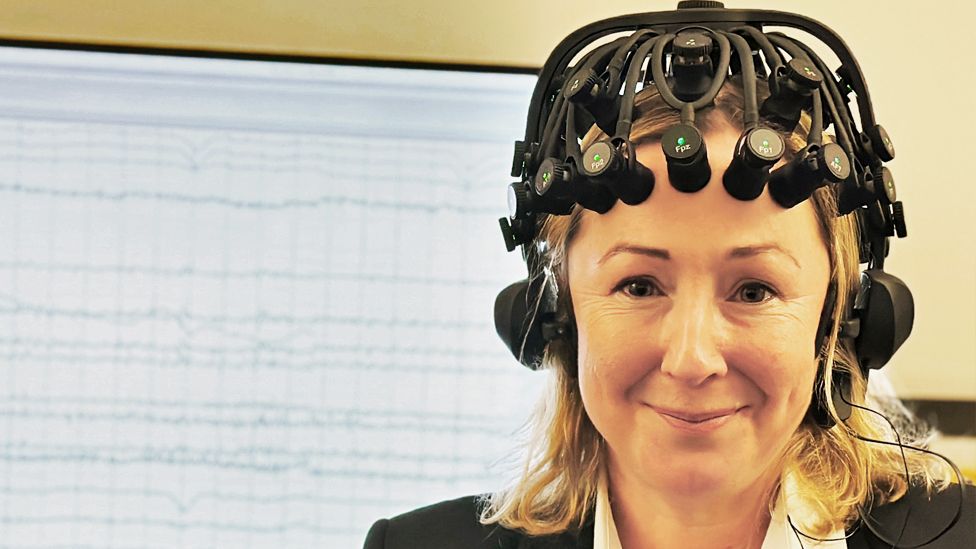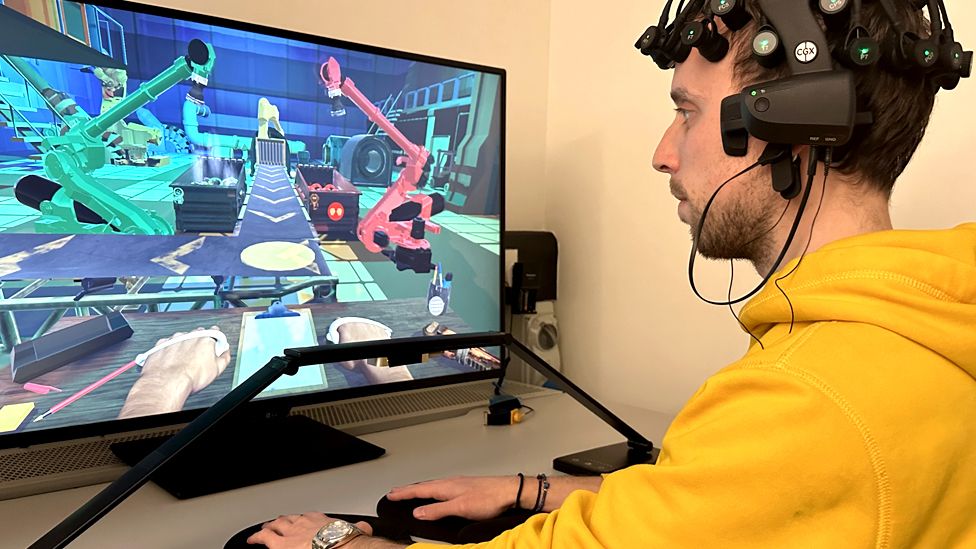A neurotech company called Cogitat is working to create a system that can convert brain activity into actions without requiring physical movement.
Simple virtual reality tasks can be completed by simply thinking about them while wearing a prototype headset.
Thus, rather than squeezing your hands to move, you think about it in a game where handles control a VR jet ski.
A similar idea is being developed by Elon Musk's company, Neuralink.
Many neurotech companies are investigating it under the name brain-computer interface.
One objective is to eventually make it possible for those who have had a stroke or other types of brain damage to operate phones or computers remotely.
The Neuralink technique calls for implanting a chip right inside the brain. To date, the company has only worked with animals, and their treatment has drawn criticism. It claims that videos it has released show a monkey mentally controlling the video game Pong and a pig with a chip in its brain thinking.
One of the companies creating a system that functions externally to the head rather than internally is Cogitat.
One day, it might resemble a headband worn with a VR headset. As a university spin-off, Cogitat is only focusing on the technology, while some businesses already produce their own hardware.

Computer scientist Dimitrios Adamos from Imperial College London and NHS consultant Allan Ponniah are in charge of it.
Though still in its infancy, the technology has already been tested on stroke patients, with promising outcomes. By making the exercises more entertaining, the goal is to motivate them to keep up the rehabilitation activities.
"A stroke victim is very demotivated to participate in rehabilitation when they are unable to move their arm. But with the help of our technology, they will be able to envision moving their hand and watching a hand move on the screen, which, in our opinion, will inspire them to begin their physiotherapy program, according to Mr. Ponniah, who was speaking on the BBC podcast Tech Tent.
It was a very strange experience when I tried it out. To begin with, thinking about moving without actually moving is more difficult than it may seem. Additionally, you have to make an effort not to think about anything else because this increases brain activity and adds more noise for the technology to decode while searching for the motor signal.
I had never before seen my own brain activity displayed in real time before, like a complex, multi-layered cardiogram, on a screen in front of me. Seeing my thoughts summarized on a graph was strange in and of itself. But it is an amazing feeling when you hear the VR jet ski engine roar, just because you have considered doing it.
The prototype device obviously didn't completely read my mind. It was not interpreting my ideas or probing deeply into my soul. It only concentrated on signals related to motor skills.
Mr. Adamos claims that nothing happens if you decide not to engage with the system. If you stop using it, there is nothing that has been gathered from you. ".
Other businesses concentrate on various forms of cognitive function, such as visual signals that allow you to concentrate on a number and interact with buttons on a screen. Focusing on more subjective responses, such as likes and dislikes, is also an option, though it is debatable.
Although Cogitat claims to have a working prototype of its technology within the next 12 months, there are still a number of obstacles that neurotech must overcome.
About how the brain works, experts are still learning. Each of us has a unique experience with it, and it fluctuates. It fluctuates throughout the day and can be impacted by aging, dehydration, fatigue, and other factors. This implies that any brain activity reading system needs to be constantly calibrated.
The calibration process is accelerated by Cogitat's use of a database of hundreds of volunteers who have tested the technology. I got to know some of the team members, who were mostly students and who guided me through the demonstration while being patient and full of energy. .
In a recent international machine-learning competition, Cogitat not only won first place, but also defeated a team from the US Army, Mr. Adamos tells me with pride.
He offered everyone a day off to celebrate, but nobody accepted.
The next day, he claims, "they were all in.". For us and everyone else who has joined us on this journey, it is incredibly fascinating.
. "







